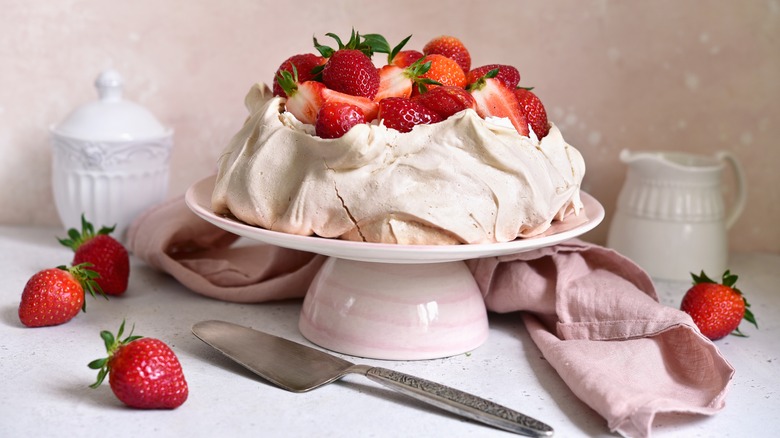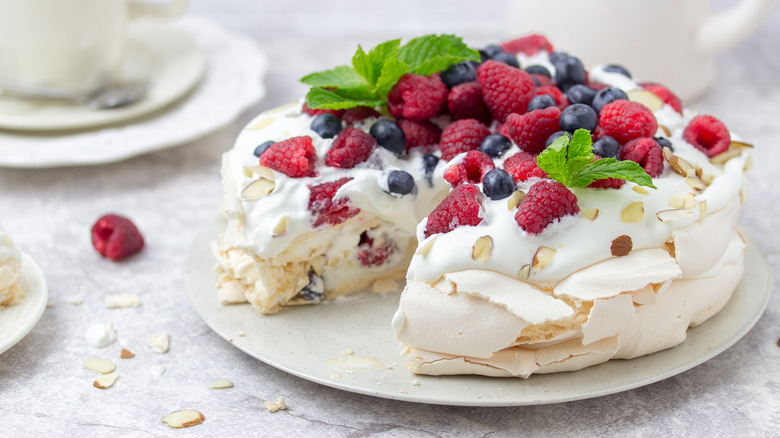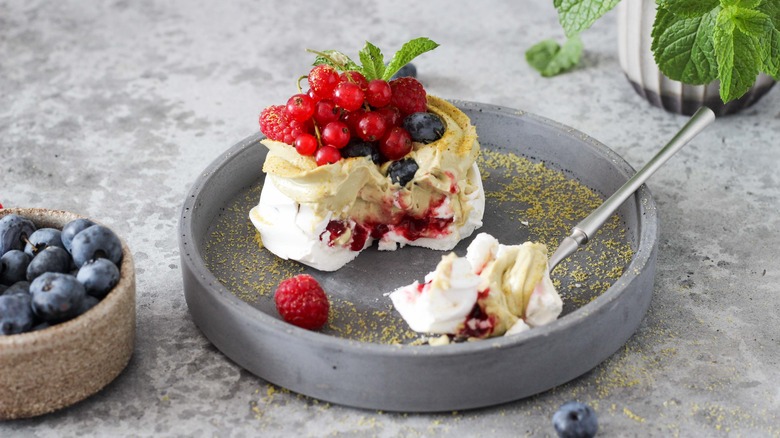How Pavlova Caused A Literal Feud Between 2 Countries
Food is a source of comfort in times of grief and distress, a rare thing that can transcend all borders to band people together. But food has also been the cause of war, conflict, and in less-grave instances, a topic that fuels er ... friendly rivalry between countries. Take Australia and New Zealand: There is little the two countries Down Under like to bicker about more than food. Flat whites, lamingtons, and Weet-Bix are all hot topics, but nothing has caused a feud quite as fierce between Aussies and Kiwis as the pavlova. Why, you ask? Because they both claim to invented the light and fluffy dessert.
There are two things that both countries agree on – and that's what a pavlova should look like, and who it was named after. Topped with whipped cream and fruit, the baked meringue dessert was named after Anna Pavlova — a prominent Russian ballerina who toured both countries in 1926 and 1929 — and the tutus that dancing ballerinas wore. Everything else is up for debate. Australians insist that the credit for pavlova goes to the chef of Esplanade Hotel in Perth, Bert Sachse, who came up with the dessert in 1935, and to the hotel's manager who named it — claiming it was "as light as Pavlova" (via the BBC). New Zealanders, however, firmly disagree: Citing published recipes dating back to 1929, they believe that pavlova is a definite Kiwi invention and Sachse's creation was nothing but a plagiarised version of what already existed.
Pavlova's origins are more complex
There are different takes on where pavlova was invented and the Oxford English Dictionary too has chimed in with its response (per the BBC). The dictionary notes that the first recorded recipe of pavlova appeared in a 1927 New Zealand cookbook called "Davis Dainty Dishes," but there was a catch: It wasn't the pavlova that we know today but rather a colorful layered jelly dessert instead. And so the pavlova wars (as the feud between the two countries has been dubbed) rages on.
In truth, the history of pavlova and its origin are more complex matters. Although the modern pavlova originated somewhere in Australasia in the early 20th century, pavlova is the descendent of meringue-based desserts that have existed for much longer. Meringue cakes decked with whipped cream and fresh fruit were a staple in German-speaking countries such as Austria, Prussia, and Bohemia in the 1700s, albeit under different names (Spanische Windtorte and schaum torte, for example). These cakes made their way across Europe and North America in the 19th century, and then to Australia and New Zealand in the early 1900s.
Even when a dish named pavlova came to be in the Australasian region, it took several forms before it turned into the airy dessert it is today. There was the colorful jelly in the 1927 cookbook, tiny little meringues flavored with coffee and walnuts that came about in 1928, and a huge meringue cake invented in 1929 — they were all called pavlova!
Divided by birth, united for Christmas
The pavlova wars have gone on for over seven decades and may very well continue for decades more, but each year, there comes a time when both countries put a momentary pause on the feud to unitedly enjoy the exquisite dessert. Christmas in Australia and New Zealand is a hot and sunny affair that is quite unlike the rich feasts enjoyed in chilly, snow-covered countries across the world. Cold mains and seafood replace roasted meats, icy drinks are preferred over warm tipples, and the wonderfully light and airy pavlova is the star of the dessert spread rather than rich pies and puddings.
No matter who invented it, pavlova is a Christmas staple in both Australia and New Zealand. The warm temperature in both countries during Christmas calls for a light dessert — and pavlova, with its soft whipped cream and juicy berries, kiwis, and passion fruits, is just that. In fact, a survey conducted by Nine found that pavlova was the most popular Christmas dessert among respondents, beating the likes of trifle, Christmas cake, and pudding to become the holiday favorite for Aussies. Though the pavlova wars may very well resume after Christmas, enjoying the sweet meringue over the holidays is far more important than squabbling over who invented it, at least for that brief period.



